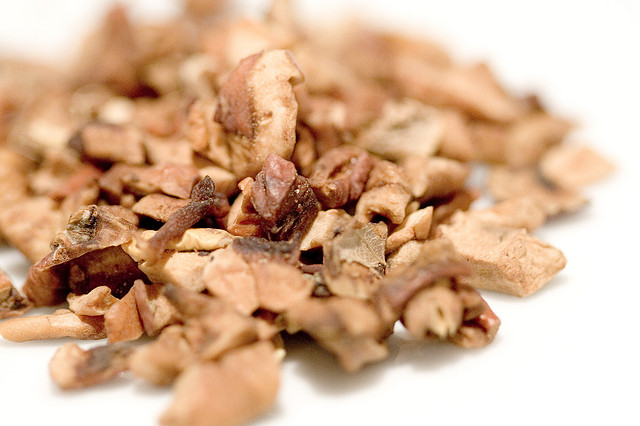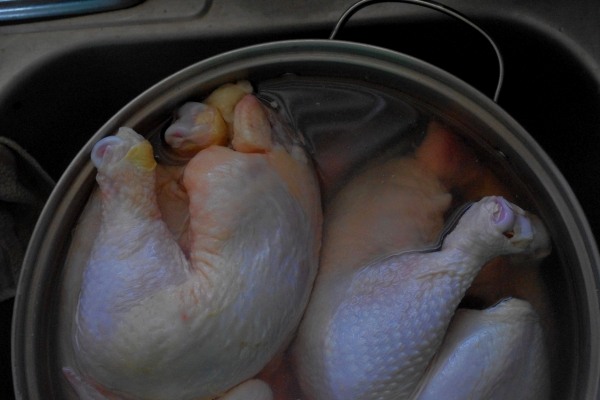Digestion and Elimination: Fixing Your Gut

Last time we went over the importance of gut flora. Now that we know that unhealthy digestion and elimination is caused by a lack of good gut flora we can discuss how to correct the delicate balance in our guts.
If you go back to Diagnosing the Health of Your Gut you can determine if you need to correct the balance or simply maintain a healthy one. Correction will take a bit more work, and sadly most of us could benefit from that extra work.
Correcting An Improper Gut Flora Balance
We have been feeding our guts bacteria since we were born. That trip down the birth canal is our first introduction to flora. That is just one of the reasons a one-in-three c-section rate is alarming.
The second introduction to gut flora happens moments after birth when we are nursed by our mothers. Breast milk passes friendly bacteria from the mother to the baby. Unfortunately it can also pass on an overgrowth of bad bacteria, resulting in thrush. The health of our guts effects our babies.
If you have missed either of these first two steps or have ever had a round of antibiotics, a starch-heavy diet, or vaccinations and have not eaten a lot of fermented foods you may want to consider taking a few extra steps to correct the balance of your gut.
The basics of healing your gut include:
- taking all difficult to digest foods out of your diet.
- removing all foods that may feed the bad bacteria out of your diet.
- feeding your body gut-healing foods like bone broths and probiotic foods.
- giving your gut time to heal.
- recolonating your gut with good bacteria through foods and a good-quality probiotic.
The best protocol that I have come across is The GAPS Diet. It can be used by adults and children alike. I have seen it help our family’s more minor gut problems, but also have heard from many who have seen vast improvements.
By going through the various stages of this diet you give your gut time to heal and reintroduce good bacteria through probiotic foods and a high-quality probiotic supplement.
Maintaining A Healthy Gut
If your gut health is already on track then maintaining it isn’t all that difficult.
Here are a few tips:
- Avoid too many sugars and starches in the diet.
- Avoid antibiotics, antibacterial soaps, and vaccinations.
- Don’t be afraid to let your children get dirty and contact other people or animals that may have different types of bacteria.
- Eat lots of fermented foods, continuously.
The latter is the most important. Eating fermented foods every day will help maintain a good balance of bacteria, help you achieve easier digestion and elimination, and help your immune system stay strong.
Examples of Fermented Foods to Eat Daily:
- Yogurt. You can make it in the crock pot, or keep it raw and make it on your counter top with special starters. (see sources)
- Milk Kefir. Easier to make than yogurt in some cases because it does not have to be kept at a constant temperature. Purchase grains once and reuse continuously. (see sources)
- Raw Cheese. A delicious concentration of the nutrients found in real milk. (see sources)
- Kombucha. If you’re new to this fermented tea check out this article. Purchase a starter and make your own for a fraction of the cost of store bought. (see sources)
- Water Kefir. A cousin of milk kefir, the grains produce a tangy-sweet probiotic version of soda pop. Faster to prepare than kombucha. (see sources)
- Lacto-Fermented Vegetables. If you’re new to fermented vegetables see this article. Our favorites include salsa, cortido, and dill pickles. It is my favorite way to store up the harvest. You can also make or purchase lacto-fermented condiments or lacto-fermented vegetables. (see sources)
I have received several question from the previous parts of this series, so I will be running a Q & A as the final part of this series.
If you have any questions please leave them in the comments and I will do my best to answer them.




I can’t link to the articles and things. Hurry, my gut needs help! Just kidding.
I was delivered by C-section, and I also had an accident when I was 11 months old, which resulted in heavy doses of antibiotics. My first gastroenterologist told me that this could have been the culprit behind the mass of bad bacteria in my gut.
My young boys and I are on GAPS. I was delivered via-section back in ’69 and I was fed formula. Both of my boys were c-section. The first because of a medical reason and the second cause I was terrified to do a VBAC. They both got some of my breastmilk for a month or so.
Both boys are failure to thrive and since doing GAPS, they’ve both gained weight. I did have to take ALL sugars including fruits, nuts, honey and sweet veggies.
I didn’t know about GAPS until recently through NT blogs. I am so grateful I found it.
Hi!
I am searching everywhere if there is a GAPS diet for babies… And what it is.
My c-section breastfed baby has a leaky gut that is causing eczema and rashes from pretty much all food. She gets hives from dairy. So eventhough she’s 8 months old she still eats only breast milk, and I’m on a strict diet because she reacts to food I eat too.
Any help…. Advice would be greatly appreciated!!
Thank you!!!
Here’s a link to the GAPS yahoo forum. Just post your question and you’ll get lots and lots of advice.
http://health.groups.yahoo.com/group/GAPShelp/
Since your baby is young, it won’t take long to heal her gut. There are many on GAPS forum that have babies. My children are 2 and 4 years old.
Here’s some info on babies on GAPS:
http://www.gaps.me/preview/?page_id=34
If that link doesn’t work, google babies and GAPS diet.
There’s loads of info on the GAPS forum about probioitics, making broth, fermenting foods/drinks, when to add new foods, stools etc.
You can simply post that you’re interested in GAPS for your daughter and that you haven’t gotten the book yet because you want to make sure that this is something that will work for your family.
Start with basics (ie adding probiotics and making chicken broth) and see how she does. If you think it’s something that will be beneficial (and it will be beneficial) then buy the book. I never bought the book but did read Breaking the Viscious Cycle (Specific Carboydrate Diet) and Body Ecology by Donna Gates. I checked out both of those books from the library. I learned tons of info from the yahoo GAPS support group though.
I hope this helps!
Thank you for your reply! I appreciate it 🙂
I have read the book, but am a little confused if I should stop breastfeeding, since milk (lactose) is not allowed.
Will ask the yahoo forum, THANK YOU!
Kristi – I emailed you privately.
Great series!
i’m a new reader, so maybe you’ve already covered this somewhere else, but i’d be really interested in hearing your gaps diet story. we have some minor digestion issues with our young kids but gaps seems soooo extreme. i don’t think i could get hubs on board (especially since i couldn’t give him an “end date”) and i don’t think i could cook two sets of meals.
i guess i’m just looking for advice with the gaps diet 🙂
I am new here, but really love this article. I checked out the diagnosing the health of your gut and loved that one too.
How many articles are there total in this series? I would love to read them all 🙂
I have a 7 yr-old daughter that has chronic constipation and has had several kidney infections, which has had her on antibiotics off and on for a good portion of her life. She was born naturally, however she was premature and I was on several medications during most of my pregnancy to stop preterm labor. She was only breast-fed for 3 wks because she had continuous thrush and was giving it to me. I then started her on formula, only because I had to. I’ve looked at the GAPS diet and it sounds wonderful, but it also sounds very very complicated and difficult, especially because I am already having to cook special for my son who deals with several severe food allergies. Is there ANY easier way??
I would like to add lacto-fermented vegetables into my diet, but because of lack of a permanent living situation and because I often live overseas, I am unable to make my own or buy from a farmer’s market. What are the best commercially-produced lacto-fermented vegetables to eat? Are all pickles, sauer kraut, etc. probiotic, even those bought from a mainstream grocery store? Any other suggestions besides pickles and sauer kraut?
My kids and I are 6 weeks into the GAPS diet (and feeling great!) and I’d also love to hear your GAPS story and how it benefited your family. It is hard when any member of the family (like my husband!) is opting out, but he’s very supportive and understanding and eats his treats when the kids are in bed.
I love the excellent summary you did on how to attain and maintain gut health!
For those interested in GAPS for whatever reason, please visit the yahoo support group for the GAPS Diet.
There are some amazing stories and so many very supportive people.
I couldn’t have come this far w/o the support group. My young boys and I are on our 11th week. My boys, who are failure to thrive, are doing fantastic on this diet.
If you think your child will benefit from this diet, you owe that to him or her.
It’s not easy and it’s not cheap in the beginning. But it is soooo worth it. And once you get started, you’ll wonder why you didn’t do it sooner. It does get easier. If you ferment lots of veggies and drinks then you won’t need to spend an arm and leg on supplemental probiotics.
I can’t recommend this diet enough.
Tina
I think everyone should read the GAPS book, whether or not they have severe gut disorders. I personally don’t have any major health issues, but I still learned oodles from reading about GAPS, and have modified some of my diet to promote better gut health. From time to time I also do a few days of really easily digestible foods (kind of like the GAPS intro) just to give my body a boost and my digestion a break.
This is a great article – easy to read and understand. I had many rounds of antibiotics as as a child and have had food allergies, depression, hay fever and skin problems throughout my life. I finally found the GAPS diet about 9 months ago and my gut is slowly healing and the depression is gone. I still feel I have a ways to go but I intend on staying on the diet for the long haul. thanks so much for writing such a clear and informative description of the diet.
The thing I had either missed or forgotten was the thing you said about letting our children play in the dirt. This is a great reminder -thanks!
Thanks for your great site. I have some points that I have experienced. 1st- After trying GAPS for months, I found it does not work for me. I experienced bloating, weight gain, diarrhea, stomach discomfort etc. 2nd- I realized my body type needed more carbs than the diet allows. I had more cravings with GAPS than how I eat now. 3rd- My gallbladder/liver have some major issues, more than a supplement can support. The more meat and fats I ate, the worse I felt. After about 2 years of trying to eat ANYTHING, I did a juice fast.
With some research, I came upon alkaline/acid foods, food combining and raw diets. I have sprouted what I can, soak/culture the rest for both myself and my husband and do the best for my body as I am able. I am still unable to have any dairy including raw cheese, (though raw cultured butter is okay), nuts of all kinds, some fruit, onions, nearly all concentrated proteins, most gluten grains even sprouted – you get the picture.
For now, my inflammation is beginning to decrease as long as I exercise at least 4 days a week. I have very specific supplements that I take with my probiotics. I am sure there are others that read your site that may like to know part of my journey. Thanks
I love the idea of these fermented foods, but everytime I try to eat them, my tongue tingles and feels very uncomfortable. Any ideas why? and what can I eat instead?
hmmmm… maybe 5 continuous years of antibiotics for ear infections might have some part in my being constipated for essentially my entire life.